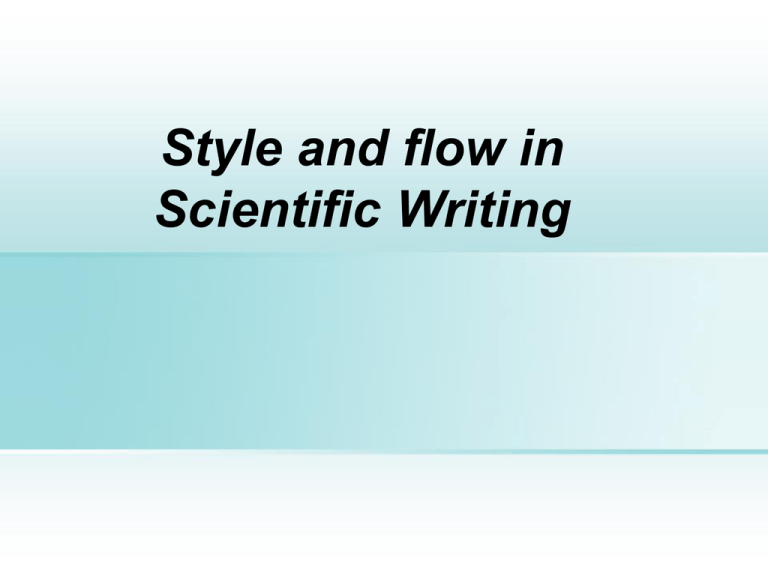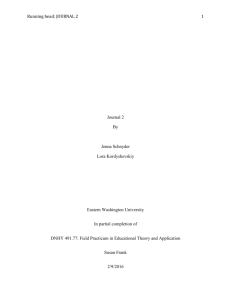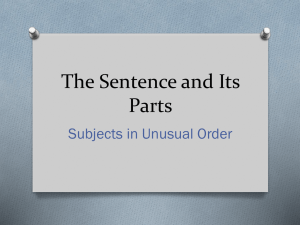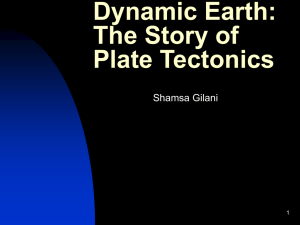山崩、土石流等自然災害嚴重威脅著這塊土地人民的生命及財產。
advertisement

Style and flow in Scientific Writing Considerations in Academic Writing Scientific writing must take into account the following considerations: • Who is the audience or the reader to whom this is addressed? • What style of wring is most appropriate? • How can this be written to flow most smoothly through the topics to be included? • What is the purpose of writing this? • How can this writing be best organized to accomplish that purpose? • How can it be best presented? 1. Audience - For whom were these written? 1. Thermal systems is a very broad field involving many separate fields of engineering. 2. Thermal systems is an interdisciplinary field which involves the traditional disciplines of thermodynamics. 3. Extractives are substances in wood that can be removed by certain solvents without affecting wood structure. 4. Extractives are substances in wood, not an integral part of the cellular structure, that can be removed by solution in hot or cold water, ether, benzene, or other solvents that do not react chemically with wood components. 5. Those descriptions are written for two quite different audiences who have different reasons for reading what you have written. In each case the audience for the first is reading for general information, while the audience for the second is reading for scientific or technical information. 2. Purpose • If the audience knows more than the author, as in thesis defense, for example, the purpose is to demonstrate a logical approach to the work and a thorough understanding of your analysis and conclusions. • If the audience knows less than the author, the purpose may be instructional and to display familiarity and expertise in the subject area and ability at scientific presentation. 3. Style • Academic writers need to use a style appropriate for the subject and the audience. That usually involves a vocabulary shift to a more formal use of words. This usually means choosing the more formal verb, noun, or other part of speech, and doing it consistently. Researchers looked at the way strain builds up around a fault. Researchers observed the way strain accumulates around a fault. 4. Verb Use Scientific writing is clearer and better understood when the appropriate verb is used in place of an expression of two or three words or more that might be common in conversation or informal writing. You should be careful to select verbs that denote the exact meaning. 1. The implementation of computer-integrated manufacturing (CIM) has resulted in some serious problems. 2. The implementation of computer-integrated manufacturing (CIM) has generated some serious problems. 3. Plans are being made to come up with a database containing detailed environmental information for the region. 4. Plans are being made to develop a database containing detailed environmental information for the region. Exercise 1 Substitute a single verb for the words in italics below: • Proposals to construct new nuclear reactors have met with great resistance from environmentalists. • Subtle changes in the earth’s crust were picked up by these new instruments. • The process should be done over until the desired results are achieved. Exercise 2 Which is more suitable? 1. The government has made good/considerable progress in solving environmental problems. 2. We got/obtained encouraging results. 3. The results of lots of/numerous different projects have been pretty good/encouraging. Avoid contractions 1. The analysis didn’t yield any new results. 2. The analysis yielded no results. 3. The problem doesn’t have many viable solutions. 4. The problem has few viable solutions. Limit the use of “run on” expressions 1. These semiconductors can be used in robots, CD players, etc. 2. These semiconductors can be used in robots, CD players, and so forth. 3. These semiconductors can be used in robots, CD players, and other electronic devices. Avoid addressing the reader as “you” 1. You can see the results in Table 1. 2. The result can be seen in Table 1. 3. Table 1 presents the results. Limit the use of direct questions 1. What can be done to lower costs? 2. We now need to consider what can be done to lower costs. 3. We now need to consider how costs may be lowered. Place adverbs with the verb 1. Then the solution can be discarded. 2. The solution can then be discarded. 3. The blood is withdrawn slowly. 4. The blood is slowly withdrawn. Reduce informality 1. If you fail the exam, you can’t enter the university. 2. If you fail the exam, you cannot enter the university. 3. You clearly can see the difference between the treated and untreated specimens. 4. The difference between the treated and untreated specimens can be clearly seen. 5. Flow Flow relates to the way in which the writer moves from one statement to the next to establish a clear connection of ideas. The following two sentences are clearly related: • Lasers have found widespread application in medicine. Lasers play an important role in the treatment of eye disease. They could be smoothly linked as: • Lasers have found widespread application in medicine. For example, they play an important role in the treatment of eye disease. Linking words and phrases addition, furthermore, in addition • The strength of the specimens was reduced by heating. Furthermore, the color was markedly darkened. In addition, they were warped. • The specimen material was stored at 1°C. In addition, it was kept in a sealed chamber to prevent contamination. Cause and effect because, since, therefore, as a result, consequently, due to, because of • Aluminum alloy parts are typically one-third to onehalf the weight of those made with steel. As a result, cars with all aluminum parts use approximately 50% less fuel than those with steel components. • The engine became very hot. Consequently, it was necessary to turn it off. Exercise 3 Supply linking words or phrases for the following: • The students were late arriving in class. They were much distracted by the noise outside the building. They missed part of the lecture. They did not pay attention to the teacher. Their exam scores were quite low. About the mid-term exam I. Translate the following text into Chinese Nearly everything we do each day is connected in some way to Earth: to its land, oceans, atmosphere, plants, and animals. The food we eat, the water we drink, our homes and offices, the clothes we wear, the energy we use, and the air we breathe are all grown in, taken from, surround, or move through the planet. By 2025, eight billion people will live on Earth. If we are to continue extracting resources to maintain a high quality of life, then we, as individuals and citizens, need to know more about our planet — its processes, its resources, and its environment. And only through Earth science education can students understand and appreciate our complex planet. To ensure a scientifically literate society, one that maintains wise stewardship of Earth’s precious resources, the American Geological Institute, in coordination with its Member Societies, endorses the National Research Council’s National Science Education Standards (1996) and agrees that Earth science should be: • Included as part of the science curriculum at all grade levels • Offered as a core credit science course for high school graduation • Assessed through state-mandated science tests and exit exams. Ultimately, however, the future lies in the hands of students, parents, grandparents, teachers, school administrators, school board officials, and politicians at all levels of government. The future of Earth science literacy — indeed, the future itself — lies in your hands. (Quote from “Why Earth Science”) II. Translate the following text into English 台灣位處歐亞大陸板塊與菲律賓海洋板塊的聚合帶上,為 全球板塊聚合作用最快速的地區之一,劇烈的地質作用衝 擊著這塊土地,地震、山崩、土石流等自然災害嚴重威脅 著這塊土地人民的生命及財產。固然天威難測,但是多一 分對大自然的認識,應該減少一分損失。過去數十年,國 人專注於經濟發展而創造了台灣經濟奇蹟,但也忽略了對 所處環境的瞭解與尊重,並堅信人定勝天,一眛地開發, 而嚐到大自然反撲的滋味。衡諸近年來的自然災害,有絕 大部分是因為人類的愚蠢及自大而造成的。如何與大自然 和平共存是一個嚴肅且必要的課題。 歐亞大陸板塊 菲律賓海洋板塊 板塊聚合作用 地震 山崩 土石流 天威難測 經濟發展, 經濟奇蹟 (the) Eurasian (continental) plate (the) Philippine Sea plate plate convergence earthquake landslide debris flow, mud flow nature (process) is unpredictable economic development, miracle 台灣位處歐亞大陸板塊與菲律賓海洋板塊的聚合帶上,為 全球板塊聚合作用最快速的地區之一,劇烈的地質作用衝 擊著這塊土地,地震、山崩、土石流等自然災害嚴重威脅 著這塊土地人民的生命及財產。 Taiwan is situated (or located) in the convergent zone (or at the junction) between the Eurasian (continental) and the Philippine Sea plates. The rate of plate convergence in this area is one of the highest in the world. Violent geological processes are striking this land; natural disasters, such as earthquake, landslide, debris flow, etc., seriously threaten the human life and property. 固然天威難測,但是多一分對大自然的認識,應該減少一 分損失。過去數十年,國人專注於經濟發展而創造了台灣 經濟奇蹟,但也忽略了對所處環境的瞭解與尊重,並堅信 人定勝天,一眛地開發,而嚐到大自然反撲的滋味。 Indeed, nature (natural process) is unpredictable, but if we know a bit better about the nature, we could (or should) reduce a bit (more) of loss (correspondingly). In the last few decades, we have concentrated in (put much emphasis on) economic development and created the “Taiwan economic miracle”. However, we have ignored the understanding of and respect to our environment. We firmly believed that nature could be conquered, so continued our blind development; but in the end we are suffering the revenge of the nature. 衡諸近年來的自然災害,有絕大部分是因為人類的愚蠢及 自大而造成的。如何與大自然和平共存是一個嚴肅且必要 的課題。 When the natural disasters of recent years are examined, (we have found) the majority of them were caused by human foolishness and arrogance. How we are (are we) going to coexist with the nature becomes a serious and necessary (essential) issue to be dealt with.











